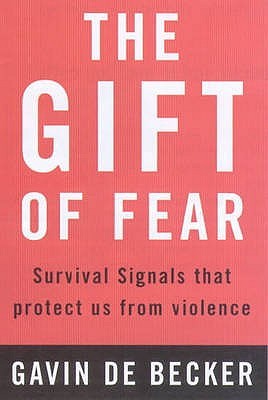De Becker, an expert on violence and safety, wrote The Gift of Fear to give us the information to break the “universal code of violence.” We all see the signs of pending danger, he claims, but we have to listen to our intuitions. At the same time, we don’t need to be hyper-vigilant and hyper-alert 24/7, seeing predators in every person we meet; this decreases the possibility of us detecting the real threats by bombarding us with signs of false threats.
Through stories and analysis of violent (or not) people, he teaches
- how to detect the risk of minor threats escalating into violence,
- how to deal with people who refuse to let go,
- how to escape date stalking and domestic violence,
- how authorities can assess threats to officials, celebrities, and normal people,
- and more.
Fear can be a curse when it dominates our lives. When used well, fear is a gift that saves our lives.
“Trusting intuition is the exact opposite of living in fear. In fact, the role of fear in your life lessons as your mind and body come to know that you will listen to the quiet wind chime (…) True fear is a survival signal that sounds only in the presence of danger, yet unwarranted fear has assumed a power over us that it holds over no other creature on earth.” The Gift of Fear, pg. 292-3
De Becker’s expertise doesn’t come only his long years of study. It comes from being raised in an abusive household where he learned to monitor the signs of violence to protect himself and his younger sister. If his name sounds familiar, you may remember him as a witness for the prosecution at the O.J. Simpson murder trial.
My one pet peeve is that he talks about his own danger-assessment and protection company, Gavin de Becker Incorporated, quite a lot. This is mildly annoying to me, though I don’t know why. In the context of the cases he discusses, the talk about his clients and coworkers makes sense. So I’ll set that aside.
His desire for all people to be safe is poured into every page. A few key points:
There is no “us” versus “them.”
Despite our culture’s ideas that those who commit violent crimes are “inhuman” “monsters”, this isn’t true. We all have the capability of violence; we won’t necessarily act on it and our justifications for it may be different. Such as, “Would you kill someone?” “No . . . unless they threatened my loved one.” In other words, yes, you would kill, just not for the same reasons as, say, a serial killer or assassin. Scary to realize that, isn’t it?
“I don’t believe in such a thing as the criminal mind. Everyone’s mind is criminal; we’re all capable of animal fantasies and thoughts.” psychiatrist Karl Menniger, quoted in The Gift of Fear, pg. 43
Predicting human violence is possible.
Random violence never is random. It makes sense to that person. By recognizing the person’s humanity, the ways he is similar to us, we can predict violence.
Domestic violence is complicated.
Restraining orders rarely work. And here’s a frightening quote:
“Spousal homicide is the single most predictable serious crime in America.” The Gift of Fear, pg. 201
Do not negotiate.
There’s a terrific and oh-so-relevant discussion of the male and female versions of “no” and the double standards of pursuit and persistence in male/female relationships. De Becker writes that he wishes all high schools in America would have a class on male/female relationships. (It wouldn’t be called “Letting Him Down Easy”, which was always a theme humming in my mind during my days as a single.) The class would teach young women to explicitly reject and to say no.
“In fact, many cases of date stalking could be described as extended rapes; they take away freedom, and they honor the desires of the man and disregard the wishes of the woman.” The Gift of Fear, pg. 208
As I read his chapter on date stalking, I remembered being a college freshman pursued by an older male student. I didn’t want to date him. I couldn’t avoid him; it was too small of a college– 500 students– to easily avoid him. We ended up in a strange, uneasy, on-and-off-again relationship– without ever going on a formal date.
What’s worse, I knew the first time I met him that he was bad news. I knew. Even when early observations of his impulsive, obsessive behavior toward other women bore out the truth of my intuition, I ignored my intuition.
I ignored that internal voice saying, “He’s a creep,” because 1) everyone else seemed to like him and he’s a student body leader, so he couldn’t be that bad, right? and, 2) I shouldn’t be so judgmental! And I paid a price. (This happened with two other young men, too.)
I wasn’t the only girl who experienced undesired romantic pursuit. I wish I’d read this book back then. I wish every girl on that campus had read it. I wish every young man had read it, every administrator, everyone who thought it was perfectly okay for the guys to pursue the girl against her wishes.
This book has a wealth of information. Please read it.
Depending on your life circumstances, certain chapters may resonate more than others. But there’s something here for everyone.

